- Home
- Harlan Coben
Tell No One (2001) Page 7
Tell No One (2001) Read online
Page 7
That explained all the designer cups. He smiled at me. I smiled back. "Tempting, but no thanks."
"How about a soft drink? We have soft drinks, Tom?"
"Sure, Nick. Coke, Diet Coke, Sprite, whatever the doctor here wants."
They smiled some more. "I'm fine, thanks," I said.
"Snapple?" Stone tried. He once again hitched up his pants. His stomach was the kind of round that made it hard to find a spot where the waistband wouldn't slide. "We got a bunch of different varieties here."
I almost said yes so that they'd get on with it, but I just gently shook him off. The table, some sort of Formica mix, was bare except for a large manila envelope. I wasn't sure what to do with my hands, so I put them on the table. Stone waddled to the side and stood there. Carlson, still taking the lead, sat on the corner of the table and swiveled to look down at me.
"What can you tell us about Sarah Goodhart?" Carlson asked.
I wasn't sure how to answer. I kept trying to figure out the angles, but nothing was coming to me.
"Doc?"
I looked up at him. "Why do you want to know?"
Carlson and Stone exchanged a quick glance. "The name Sarah Goodhart has surfaced in connection with an ongoing investigation," Carlson said.
"What investigation?" I asked.
"We'd rather not say."
"I don't understand. How am I connected into this?"
Carlson let loose a sigh, taking his time on the exhale. He looked over at his rotund partner and suddenly all smiles were gone. "Am I asking a complicated question here, Tom?"
"No, Nick, I don't think so."
"Me neither." Carlson turned his eyes back at me. "Maybe you object to the form of the question, Doc. That it?"
"That's what they always do on The Practice, Nick," Stone chimed in. "Object to the form of the question."
"That they do, Tom, that they do. And then they say, 'I'll rephrase', right? Something like that."
"Something like that, yeah."
Carlson looked me down. "So let me rephrase: Does the name Sarah Goodhart mean anything to you?"
I didn't like this. I didn't like their attitude or the fact that they had taken over for Lowell or the way I was getting grilled in this conference room. They had to know what the name meant. It wasn't that difficult. All you had to do was casually glance at Elizabeth's name and address. I decided to tread gently.
"My wife's middle name is Sarah," I said.
"My wife's middle name is Gertrude," Carlson said.
"Christ, Nick, that's awful."
"What's your wife's middle name, Tom?"
"McDowd. It's a family name."
"I like when they do that. Use a family name as a middle name. Honor the ancestors like that."
"Me too, Nick."
Both men swung their gazes back in my direction.
"What's your middle name, Doc?"
"Craig," I said.
"Craig," Carlson repeated. "Okay, so if I asked you if the name, say" 'he waved his arms theatrically' "Craig Dipwad meant anything to you, would you chirp up, 'Hey, my middle name is Craig'?"
Carlson flashed me the hard eyes again.
"I guess not," I said.
"I guess not. So let's try it again: Have you heard the name Sarah Goodhart, yes or no?"
"You mean ever?"
Stone said, "Jesus Christ."
Carlson's face reddened. "You playing semantic games with us now, Doc?"
He was right. I was being stupid. I was flying blind, and that last line of the email 'Tell no one' kept flashing in my head like something in neon. Confusion took over. They had to know about Sarah Goodhart. This was all a test to see if I was going to cooperate or not. That was it. Maybe. And cooperate about what?
"My wife grew up on Goodhart Road," I said. They both moved back a little, giving me room, folding their arms. They led me to a pool of silence and I foolishly dived in. "See, that's why I said Sarah was my wife's middle name. The Goodhart made me think of her."
"Because she grew up on Goodhart Road?" Carlson said.
"Yes."
"Like the word Goodhart was a catalyst or something?"
"Yes," I said again.
"That makes sense to me." Carlson looked at his partner. "That make sense to you, Tom?"
"Sure," Stone agreed, patting his stomach. "He wasn't being evasive or anything. The word Goodhart was a catalyst."
"Right. That's what got him thinking about his wife."
They both looked at me again. This time I forced myself to keep quiet.
"Did your wife ever use the name Sarah Goodhart?" Carlson asked.
"Use it how?"
"Did she ever say, "Hi, I'm Sarah Goodhart," or get an ID with that name or check into some hot-sheets under that name'"
"No," I said.
"You sure?"
"Yes."
"That the truth?"
"Yes."
"Don't need another catalyst?"
I straightened up in the chair and decided to show some resolve. "I don't much like your attitude, Agent Carlson."
His toothy, dentist-proud smile returned, but it was like some cruel hybrid of its earlier form. He held up his hand and said, "Excuse me, yeah, okay, that was rude." He looked around as though thinking about what to say next. I waited.
"You ever beat up your wife, Doc?"
The question hit me like a whiplash. "What?"
"That get you off? Smacking around a woman?"
"What... are you insane?"
"How much life insurance did you collect when your wife died?"
I froze. I looked at his face and then at Stone's. Totally opaque. I couldn't believe what I was hearing. "What's going on here?"
"Please just answer the question. Unless, of course, you got something you don't want to tell us."
"It's no secret," I said. "The policy was for two hundred thousand dollars."
Stone whistled. "Two hundred grand for a dead wife. Hey, Nick, where do I get in line?"
"That's a lot of life insurance for a twenty-five year-old woman."
"Her cousin was starting out with State Farm," I said, my words stumbling over one another. The funny thing is, even though I knew I hadn't done anything wrong ' at least not what they thought ' I started feeling guilty. It was a weird sensation. Sweat started pouring down my armpits. "She wanted to help him out. So she bought this big policy."
"Nice of her," Carlson said.
"Real nice," Stone added. "Family is so important, don't you think?"
I said nothing. Carlson sat back down on the table's corner. The smile was gone again. "Look at me, Doc."
I did. His eyes bore into mine. I managed to maintain eye contact, but it was a struggle.
"Answer my question this time," he said slowly. "And don't give me shocked or insulted. Did you ever hit your wife?"
"Never," I said.
"Not once?"
"Not once."
"Ever push her?"
"Never."
"Or lash out in anger. Hell, we've all been there, Doc. A quick slap. No real crime in that. Natural when it comes to the affairs of the heart, you know what I mean?"
"I never hit my wife," I said. "I never pushed her or slapped her or lashed out in anger. Never."
Carlson looked over at Stone. "That clear it up for you, Tom?"
"Sure, Nick. He says he never hit her, that's good enough for me."
Carlson scratched his chin. "Unless."
"Unless what, Nick?"
"Well, unless I can provide Dr. Beck here with another one of those catalysts."
All eyes were on me again. My own breaths echoed in my ears, hitched and uneven. I felt light-headed. Carlson waited a beat before he snatched up the large manila envelope. He took his time untying the string flap with long, slender fingers and then he opened the slit. He lifted it high in the air and let the contents fall to the table.
"How's this for a catalyst, huh, Doc?"
They were photographs. Carls
on pushed them toward me. I looked down and felt the hole in my heart expand.
"Dr. Beck?"
I stared. My fingers reached out tentatively and touched the surface.
Elizabeth.
They were photographs of Elizabeth. The first one was a close up of her face. She was in profile, her right hand holding her hair back away from her ear. Her eye was purple and swollen. There was a deep cut and more bruising on her neck, below the ear.
It looked as though she'd been crying.
Another photo was shot from the waist up. Elizabeth stood wearing only a bra, and she was pointing to a large discoloration on her rib cage. Her eyes still had that red-tinged rim. The lighting was strangely harsh, as though the flash itself had sought out the bruise and pulled it closer to the lens.
There were three more photographs ' all from various angles and of various body parts. All of them highlighted more cuts and bruises.
"Dr. Beck?"
My eyes jerked up. I was almost startled to see them in the room. Their expressions were neutral, patient. I faced Carlson, then Stone, then I went back to Carlson.
"You think I did this?"
Carlson shrugged. "You tell us."
"Of course not."
"Do you know how your wife got those bruises?"
"In a car accident."
They looked at each other as though I'd told them my dog ate my homework.
"She got into a bad fender-bender," I explained.
"When?"
"I'm not sure exactly. Three, four months before" 'the words got
stuck for a second' "before she died."
"Did she visit a hospital?"
"No, I don't think so."
"You don't think?"
"I wasn't around."
"Where were you?"
"I was doing a pediatric workshop in Chicago at the time. She told me about the accident when I got home."
"How long after did she tell you?"
"After the accident?"
"Yeah, Doc, after the accident."
"I don't know. Two, three days maybe."
"You two were married by then?"
"For just a few months."
"Why didn't she tell you right away?"
"She did. I mean, as soon as I got home. I guess she didn't want to worry me."
"I see," Carlson said. He looked at Stone. They didn't bother masking their skepticism. "So did you take these pictures, Doc?"
"No," I said. As soon as I did, I wished I hadn't. They exchanged another glance, smelling blood. Carlson tilted his head and moved closer.
"Have you ever seen these pictures before?"
I said nothing. They waited. I thought about the question. The answer was no, but... where did they get them? Why didn't I know about them? Who took them? I looked at their faces, but they gave away nothing.
It's an amazing thing really, but when you think about it, we learn life's most important lessons from TV. The vast majority of our knowledge about interrogations, Miranda rights, self-incriminations, cross-examinations, witness lists, the jury system, we learn from NYPD Blue and Law & Order and the like. If I tossed you a gun right now and asked you to fire it, you'd do what you saw on TV. If I told you to look out for a "tail," you'd know what I'm talking about because you'd seen it done on Mannix or Magnum PI.
I looked up at them and asked the classic question: "Am I a suspect?"
"Suspect for what?"
"For anything," I said. "Do you suspect that I committed any crime?"
"That's a pretty vague question, Doc."
And that was a pretty vague answer. I didn't like the way this was going. I decided to use another line I learned from television.
"I want to call my lawyer," I said.
Chapter 10
I don't have a criminal lawyer ' who does? ' so I called Shauna from a pay phone in the corridor and explained the situation. She wasted no time.
"I got just the person," Shauna said. "Sit tight."
I waited in the interrogation room. Carlson and Stone were kind enough to wait with me. They spent the time whispering to each other. Half an hour passed. Again the silence was unnerving. I know that was what they wanted. But I couldn't stop myself. I was innocent, after all. How could I harm myself if I was careful?
"My wife was found branded with the letter K," I said to them.
They both looked up. "Pardon me," Carlson said, craning his long neck back in my direction. "You talking to us?"
"My wife was found branded with the letter K," I repeated. "I was in the hospital after the attack with a concussion. You can't possibly think..." I let it hang.
"Think what?" Carlson said.
In for a penny, in for a pound. "That I had something to do with my wife's death."
That was when the door burst open, and a woman I recognized from television stamped into the room. Carlson jumped back when he saw her. I heard Stone mumble "Holy shit" under his breath.
Hester Crimstein didn't bother with intros. "Didn't my client ask for counsel?" she asked.
Count on Shauna. I had never met my attorney, but I recognized her from her stints as a "legal expert" on talk shows and from her own Crimstein on Crime program on Court TV. On the screen Hester Crimstein was quick and cutting and often left guests in tatters. In person, she had the most bizarre aura of power, the kind of person who looks at everyone as though she were a hungry tiger and they were limping gazelles.
"That's right," Carlson said.
"Yet here you are, all nice and cozy, still questioning him."
"He started talking to us."
"Oh, I see." Hester Crimstein snapped open her briefcase, dug out a pen and paper, and tossed them onto the table. "Write down your names."
"Pardon?"
"Your names, handsome. You know how to spell them, right?"
It was a rhetorical question, but Crimstein still waited for an answer.
"Yeah," Carlson said.
"Sure," Stone added. "Good. Write them down. When I mention on my show how you two trampled my client's constitutional rights, I want to make sure I get the names right. Print plainly, please."
She finally looked at me. "Let's go."
"Hold up a second," Carlson said. "We'd like to ask your client a few questions."
"No."
"No? Just like that?"
"Exactly like that. You don't talk to him. He doesn't talk to you. Ever. You two understand?"
"Yes," Carlson said.
She turned her glare to Stone.
"Yes," Stone said.
"Swell, fellas. Now are you arresting Dr. Beck?"
"No."
She turned in my direction. "What are you waiting for?" she snapped at me. "We're out of here."
Hester Crimstein didn't say a word until we were safely ensconced in her limousine.
"Where do you want me to drop you off?" she asked.
I gave the driver the clinic's address.
"Tell me about the interrogation," Crimstein said. "Leave out nothing."
I recounted my conversation with Carlson and Stone as best I could. Hester Crimstein didn't so much as glance in my direction. She took out a day planner thicker than my waist and started leafing through it.
"So these pictures of your wife," she said when I finished. "You didn't take them?"
"No."
"And you told Tweedledee and Tweedledum that?"
I nodded.
She shook her head. "Doctors. They're always the worst clients." She pushed back a stand of hair. "Okay, that was dumb of you, but not crippling. You say you've never seen those pictures before?"
"Never."
"But when they asked you that, you finally shut up."
"Yes."
"Better," she said with a nod. "That story about her getting those bruises in a car accident. Is it the truth?"
Pardon me?"
Crimstein closed her day planner. "Look... Beck, is it? Shauna says everyone calls you Beck, so you mind if I do the same?"
/> "No."
"Good. Look, Beck, you're a doctor, right?"
"Right."
"You good at bedside manner?"
"I try to be."
"I don't. Not even a little. You want coddling, go on a diet and hire Richard Simmons. So let's skip all the pardon-mes and excuse-mes and all that objectionable crap, okay? Just answer my questions. The car accident story you told them. Is it true?"
"Yes."
"Because the feds will check all the facts. You know that, right?"
"I know."
"Okay, fine, just so we're clear here." Crimstein took a breath. "So maybe your wife had a friend take these pictures," she said, trying it on for size. "For insurance reasons or something. In case she ever wanted to sue. That might make sense, if we need to peddle it."
It didn't make sense to me, but I kept that to myself.
"So question uno: Where have these pictures been, Beck?"
"I don't know."
"Dos and tres: How did the feds get them? Why are they surfacing now?"
I shook my head.
"And most important, what are they trying to nail you on? Your wife's been dead for eight years. It's a little late for a spousal battery charge." She sat back and thought about it a minute or two. Then she looked up and shrugged. "No matter. I'll make some calls, find out what's up. In the meantime, don't be a dimwit. Say nothing to anyone. You understand?"
"Yes."
She sat back and thought about it some more. "I don't like this," she said. "I don't like this even a little bit."
Chapter 11
On May 12, 1970, Jeremiah Renway and three fellow radicals set off an explosion at Eastern State University's chemistry department. Rumor had it from the Weather Underground that military scientists were using the university labs to make a more powerful form of napalm. The four students, who in a fit of stark originality called themselves Freedom's Cry, decided to make a dramatic albeit showy stand.
At the time, Jeremiah Renway did not know if the rumor was true. Now, more than thirty years later, he doubted it. No matter. The explosion did not damage any of the labs. Two university security guards, however, stumbled across the suspicious package. When one picked it up, the package exploded, killing both men.
Both had children.
One of Jeremiah's fellow "freedom fighters" was captured two days later. He was still in jail. The second died of colon cancer in 1989. The third, Evelyn Cosmeer, was captured in 1996. She was currently serving a seven-year prison sentence.

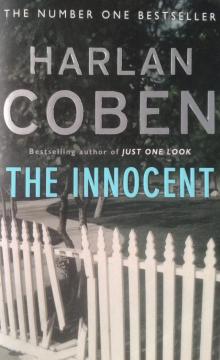 The Innocent
The Innocent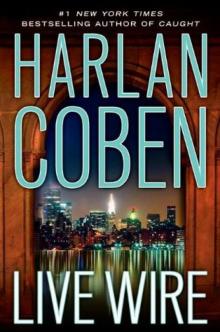 Live Wire
Live Wire Play Dead
Play Dead Drop Shot
Drop Shot Seconds Away
Seconds Away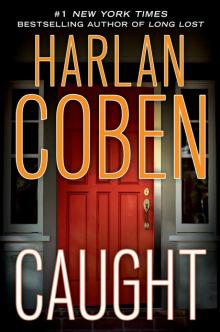 Caught
Caught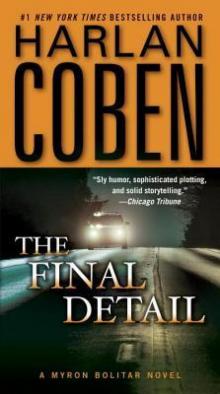 The Final Detail
The Final Detail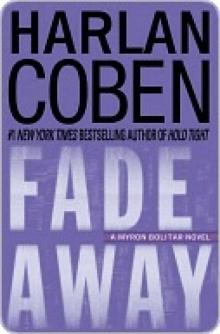 Fade Away
Fade Away Home
Home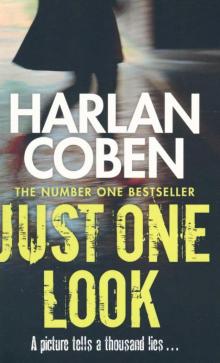 Just One Look
Just One Look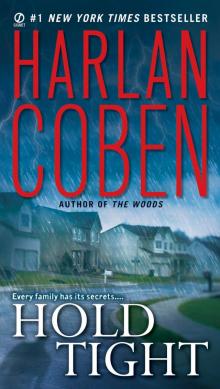 Hold Tight
Hold Tight Fool Me Once
Fool Me Once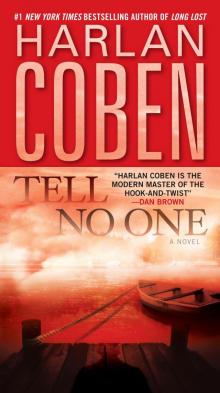 Tell No One
Tell No One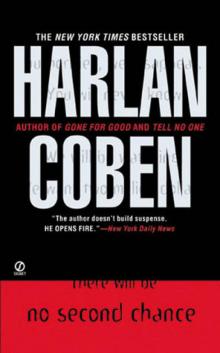 No Second Chance
No Second Chance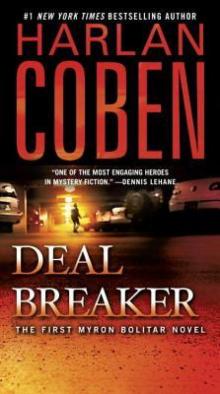 Deal Breaker
Deal Breaker Long Lost
Long Lost One False Move
One False Move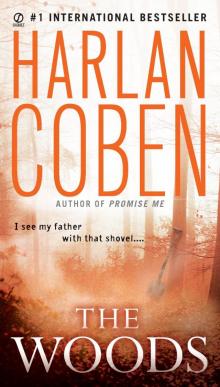 The Woods
The Woods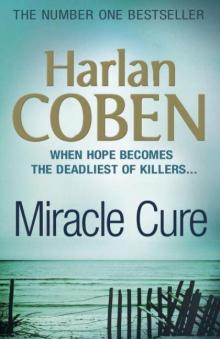 Miracle Cure
Miracle Cure Found
Found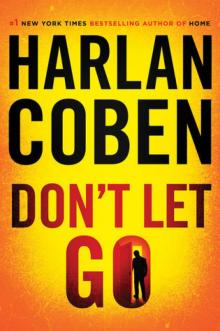 Don't Let Go
Don't Let Go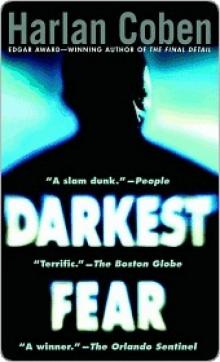 Darkest Fear
Darkest Fear The Stranger
The Stranger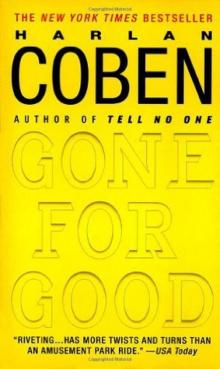 Gone for Good
Gone for Good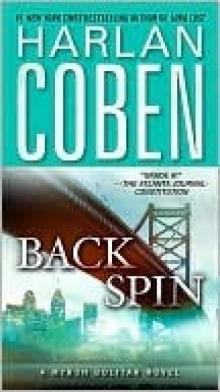 Back Spin
Back Spin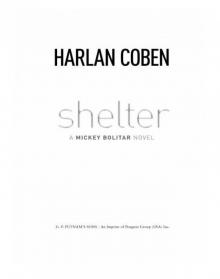 Shelter
Shelter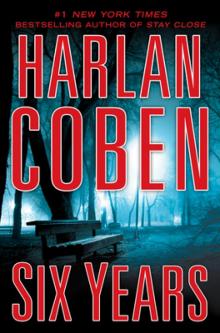 Six Years
Six Years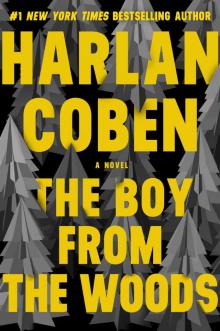 The Boy from the Woods
The Boy from the Woods Missing You
Missing You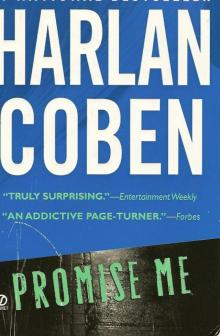 Promise Me mb-8
Promise Me mb-8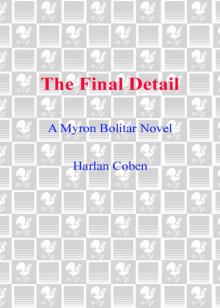 The Final Detail: A Myron Bolitar Novel
The Final Detail: A Myron Bolitar Novel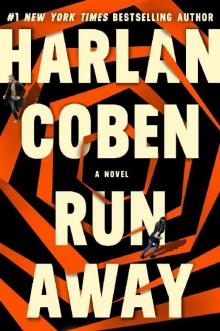 Run Away
Run Away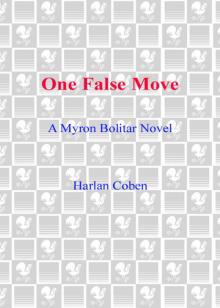 One False Move: A Myron Bolitar Novel
One False Move: A Myron Bolitar Novel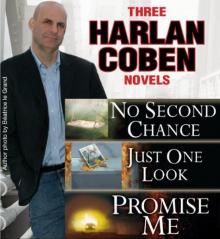 Three Harlan Coben Novels
Three Harlan Coben Novels the Woods (2007)
the Woods (2007) Tell No One (2001)
Tell No One (2001) the Innocent (2005)
the Innocent (2005)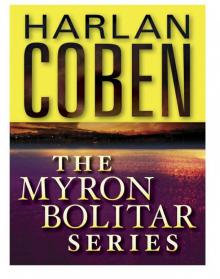 The Myron Bolitar Series 7-Book Bundle
The Myron Bolitar Series 7-Book Bundle Gone for Good (2002)
Gone for Good (2002) Caught (2010)
Caught (2010) Hold Tight (2008)
Hold Tight (2008)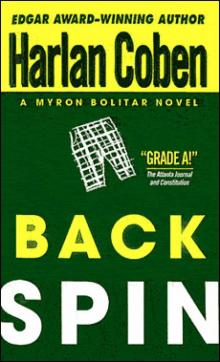 04 - Back Spin
04 - Back Spin Miracle Cure (1991)
Miracle Cure (1991)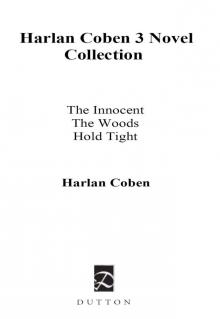 Harlan Coben 3 Novel Collection
Harlan Coben 3 Novel Collection Just One Look (2004)
Just One Look (2004)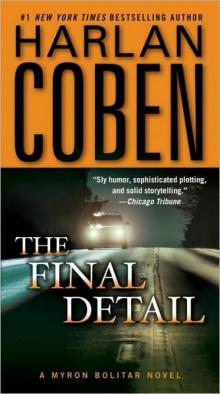 The Final Detail mb-6
The Final Detail mb-6 Play Dead (2010)
Play Dead (2010)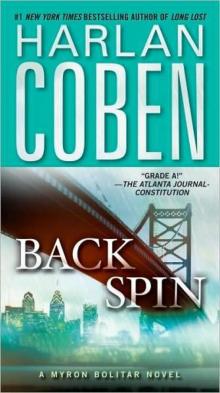 Back Spin mb-4
Back Spin mb-4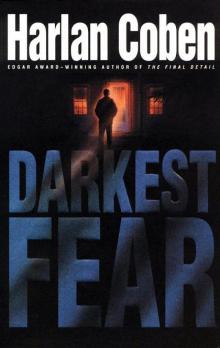 Darkest Fear mb-7
Darkest Fear mb-7